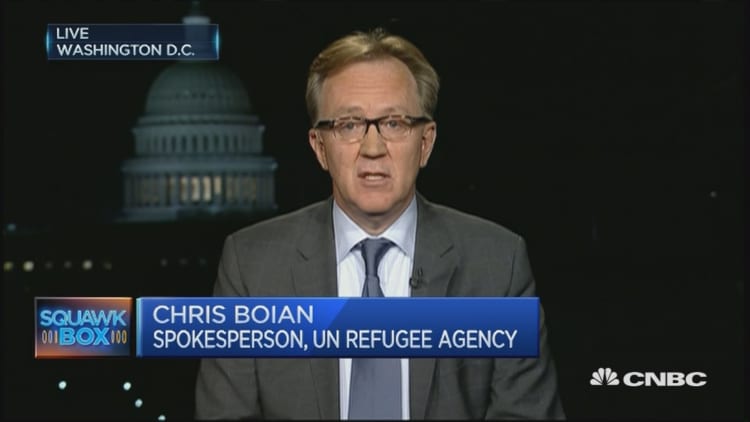In the past week, more than 30,000 people have fled Aleppo, running in the face of militias loyal to the Syrian government. The Syrian government said Thursday it had retaken the city.
Some of the lucky refugees have reached safer places in Syria, like a mother of four who arrived at a center where Portland, Oregon-based Mercy Corps was working. She was given a food kit, water and winter clothes for warm against the 2 or 3 inches of snow that fell this week.
Next up for that mother, if all goes well: cash, probably $75 worth of Syrian pounds in the form of a voucher or, eventually, e-money.
More from Change the World:
Here's how to donate to charity and really boost your tax savings
America's dirty little secret: 42 million people are suffering from hunger
5 ways to teach your kids the art of giving
Traditionally, the response of aid agencies and governments to refugee crises has been to set up camps and distribute supplies, like rice or bedding. But experts say technology has enabled a faster and better way to help: Money that enables refugees to buy what they decide they need. Cash can be used worldwide in crises through debit cards and mobile money. In Syria, aid agencies have to work with traditional local finance entities, because most Western and Turkish banks aren't operating in the country.
"Cash is the most rapid mechanism you can use," said Tom Byrnes, an expert on cash transfers and a cash delegate for the International Federation of Red Cross and Red Crescent Societies.
Mercy Corps. which serves 470,000 Syrians inside the country and has about 100 people in the area, is expanding its digital cash programs to give refugee families from Aleppo $75 as they arrive in welcome centers. Many refugees are arriving in the Idlib province in the western part of Syria. New York-based IRC, another large aid agency, is also operating a small cash program in Idlib.

As long as refugees arrive where there are functioning stores, cash transfers work more efficiently than traditional aid, evidence shows. In Lebanon, for instance, an IRC report found that 87,700 Syrian refugee families each given $575 via ATM cards spent the money on food, clothes, fuel oil and getting out of debt. More children stayed in school because fewer families sent their kids out to work.
Even where there are no formal markets, informal markets and shops tend to spring up rapidly, like refugee camps and communities.
That $75 is not a lot to an American family — a survey from the American Research Group found shoppers planning to spend $929 this year on gifts — but in Syria it goes a long way. On the Syrian black market, the dollar buys more than 500 Syrian pounds, according to Steve Hanke, director of the Troubled Currencies Project at the Cato Institute.
If markets are open, cash is the most rapid mechanism you can use.Tom Byrnesexpert on cash transfers and a cash delegate for the International Federation of Red Cross and Red Crescent Societies
The humanitarian system for many years has been accused of being inefficient and in some cases corrupt — another reason that efficiency of cash is being embraced.
A four-country study comparing cash transfers and food aid found that 18 percent more people could be helped for the same amount of money. And in one study in Somalia, researchers found that only 35 percent of a food aid budget went to beneficiaries, compared to a cash program, where 85 percent of aid went to beneficiaries.
Cash, like e-money, can be even better than food vouchers, said a spokeswoman for Mercy Corps.
"Vouchers generally restrict purchases to food, and we found a bias toward purchasing sugar, tea and halawa (a local sweet product)," she said by email. "That's because people didn't have money to buy fuel for cooking, so they opted for items that provide high energy with minimal cooking time."
Cash is rapidly spreading in the humanitarian system. Mercy Corps said it will give 25 percent of its aid in cash by 2018, and IRC plans to do the same by 2020. Only about 6 percent of the world's humanitarian aid currently comes in the form of cash, according to the Washington, D.C.-based Center for Global Development.
In Syria it's likely that much more help will be needed immediately. Refugees fleeing to Idlib have found what most people believe are only temporary havens. Many other cities in Syria are held by rebels or other factions in the civil war, and they are likely to come under further attack, said aid agencies.
— By Elizabeth MacBride, special to CNBC.com
This story is part of NBCU's Share Kindness. Follow the series on Facebook, Twitter, and Instagram. #ShareKindness




